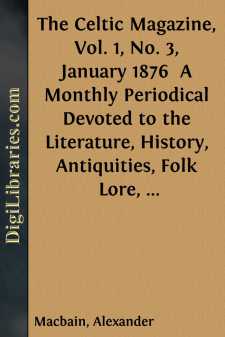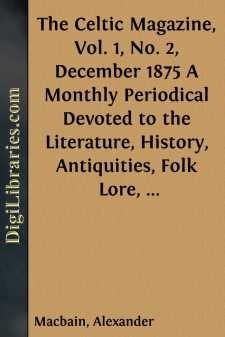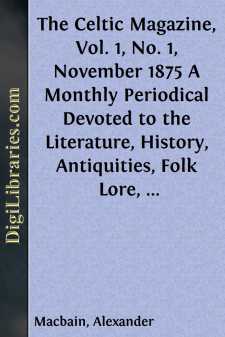Categories
- Antiques & Collectibles 13
- Architecture 36
- Art 48
- Bibles 22
- Biography & Autobiography 813
- Body, Mind & Spirit 141
- Business & Economics 28
- Children's Books 12
- Children's Fiction 9
- Computers 4
- Cooking 94
- Crafts & Hobbies 4
- Drama 346
- Education 46
- Family & Relationships 57
- Fiction 11826
- Games 19
- Gardening 17
- Health & Fitness 34
- History 1377
- House & Home 1
- Humor 147
- Juvenile Fiction 1873
- Juvenile Nonfiction 202
- Language Arts & Disciplines 88
- Law 16
- Literary Collections 686
- Literary Criticism 179
- Mathematics 13
- Medical 41
- Music 40
- Nature 179
- Non-Classifiable 1768
- Performing Arts 7
- Periodicals 1453
- Philosophy 64
- Photography 2
- Poetry 896
- Political Science 203
- Psychology 42
- Reference 154
- Religion 513
- Science 126
- Self-Help 83
- Social Science 81
- Sports & Recreation 34
- Study Aids 3
- Technology & Engineering 59
- Transportation 23
- Travel 463
- True Crime 29
Alexander Macbain
Alexander Macbain (1855–1907) was a Scottish scholar, historian, and lexicographer renowned for his contributions to Celtic studies. He is best known for his work "An Etymological Dictionary of the Gaelic Language" (1896), which became a foundational text in understanding the Gaelic language's roots. Macbain also wrote "Celtic Mythology and Religion," exploring the rich traditions and beliefs of the Celtic peoples. In addition to his scholarly achievements, he was an advocate for preserving Gaelic culture and language during a time when it faced decline.
Author's Books:
Sort by:
THE STATE OF THE OSSIANIC CONTROVERSY. [Continued.] Mr Arnold in that handsome, but slightly ambiguous admission of his, that the Celts in their intellectual capacity come very near the secret of nature and of natural magic, does not seem to imply more in reality than that they have a subtler sense of certain natural affinities than their Anglo-Saxon brethren have; that they apprehend more surely when,...
more...
In controversy about Ossian, the man on the affirmative side has an immeasurable advantage over all others; and, with an average practical acquaintance with the subject, may exhaust any antagonist. The contents, the connection, and the details; the origin, the tradition, the translation; the poetry, the sentiment, the style; the history, the characters, the dramatis personæ; the aspects of nature...
more...
INTRODUCTORY. In the circular issued, announcing the Celtic Magazine, we stated that it was to be a Monthly Periodical, written in English, devoted to the Literature, History, Antiquities, Traditions, Folk-lore, and the Social and Material Interests of the Celt at Home and Abroad: that it would be devoted to Celtic subjects generally, and not merely to questions affecting the Scottish Highlands:...
more...




